“Tell me,” wrote poet Mary Oliver, “what is it you plan to do with your one wild and precious life?” Which led meme genius, Sarah Lazarus, to ask, “What is it you plan to do with your one wild and precious month between Covid waves?”
I laughed when I read this. Nervously.
We’re all a little nervous these days. In fact, many of us are flat-out panicked. Mental health studies show that diagnosed anxiety disorder has quadrupled during the pandemic. But just as we can minimize our risk of viral infection, we can reduce our anxiety with a few simple practices.
Anti-Anxiety Practice #1: Wash Up
Remember how in 2020 we all learned to REALLY wash our hands, singing “Happy Birthday” twice while we scrubbed? Well, brains accumulate worries like hands accumulate germs. We end up in what some psychologists call “worry traps.” And without some deliberate mental hygiene, those traps can become debilitating anxiety.
The most common worry traps are an obsession with problems that may arise in the future, a tight focus on negative events in the present, and constantly asking the question “But what if ?”
If you find yourself engaging in any of these, it’s time to clean your brain by proactively focusing on good things that may happen, the most positive events around us, and asking “Hey, what if ?”
If you’re already anxious, this may sound unconvincing or even dangerous. But living in constant anxiety makes us more prone to problems, less capable of seeing solutions. Try tidying up your mind several times a day, the way you wash your hands.
Anti-Anxiety Practice #2: Filter Information
Anyone who understands the word “contagious” knows enough to avoid breathing in whatever other people breathe out. Well, anxiety is also catching. We get it from taking in random information without any filtering.
Remember that every manufacturer, advertiser, and news agency out there is vying for attention—and frightening images grab our attention like the Jaws of Life. This means that every time you scan your phone, TV, or computer, you see the worst things happening on the planet.
It’s bad out there, no question. It’s wise to stay informed, and crucial to do whatever we can to help victims of war, natural disaster, poverty, illness. But after doing what we can, we must rest and recharge, or we’ll turn into anxious wrecks incapable of helping anyone.
To stay anxiety-free, we need to periodically disconnect from all that attention-grabbing bad news. By shrinking our focus to the present moment, enjoying simple pleasures, and leaving tomorrow’s work for tomorrow, we can show up with the energy and optimism the world so desperately needs.
Anti-Anxiety Practice #3: Slow Down
Even if you follow the advice above, you may still come down with symptoms of anxiety: constant fear, racing heart, foggy mind. Don’t push yourself to “Just cheer up!” Once you’re anxious, all that pushing feels like an attack. Instead, slow down.
I mean this literally. Slow down your physical movements: your walking pace, your hand motions, your breath. Slow your thoughts (you can do this by writing them down, which stretches them out in time). This ratchets down anxiety and allows you to heal.
Rest and kindness are the simple medicines that heal anxious hearts. Our nervous systems thrive on simple sensory pleasures: favorite songs, tasty snacks, a cuddle with a being you love (pets definitely count). Make this moment as gentle as you can, and then inhabit it completely. Little by little, your anxiety will ease.
Stay Healthy, Stay Happy
Waves of anxiety, like waves of viruses, will keep affecting humans as long as we exist. But that’s not a disaster—as long as we persist in regaining our balance. Keep your heart and mind healthy, as well as your body, and you can do virtually anything with your one wild and precious life.











3 comments
AT 1:15 PM
AT 12:21 PM
AT 11:00 AM